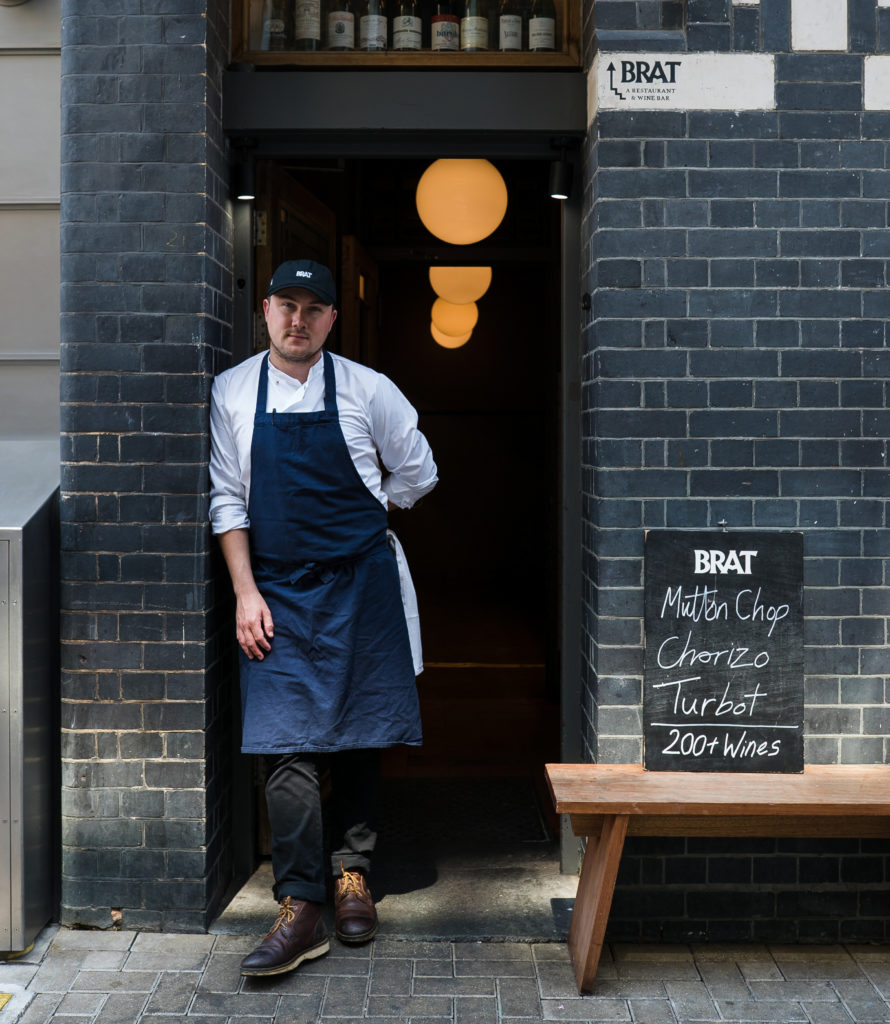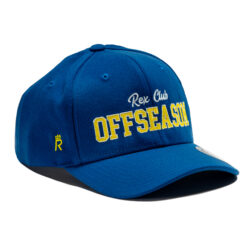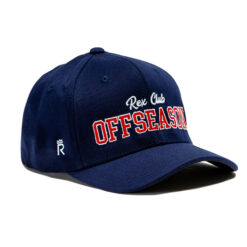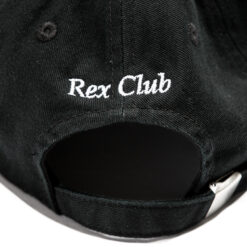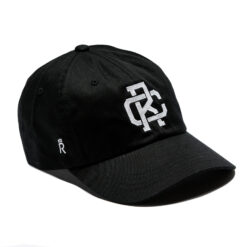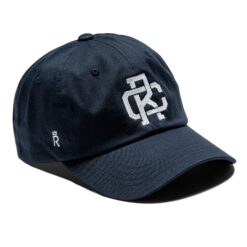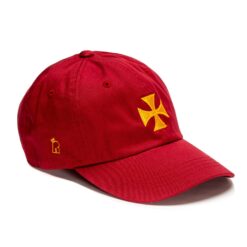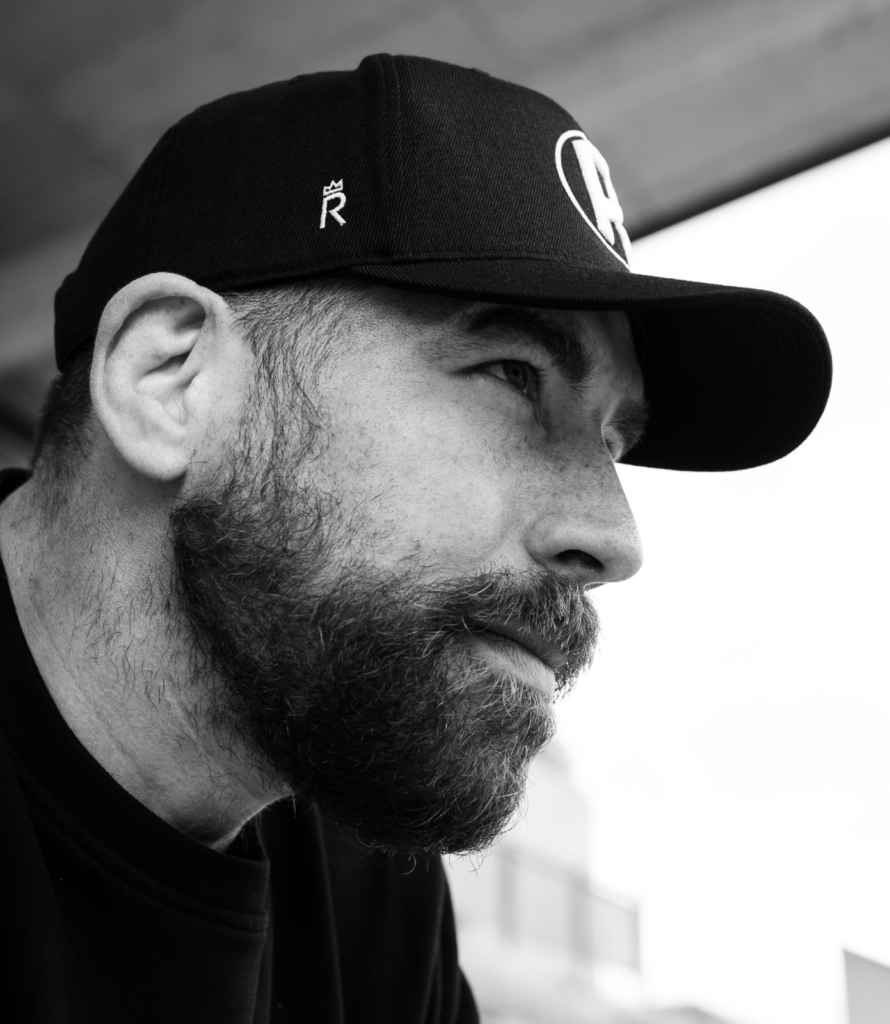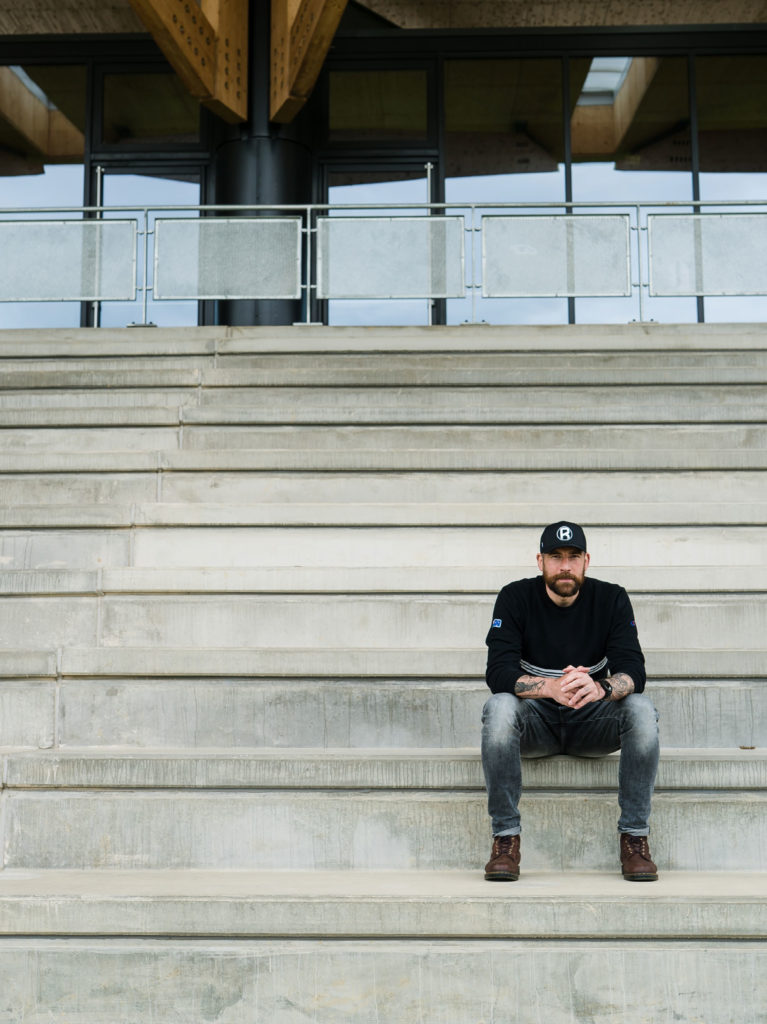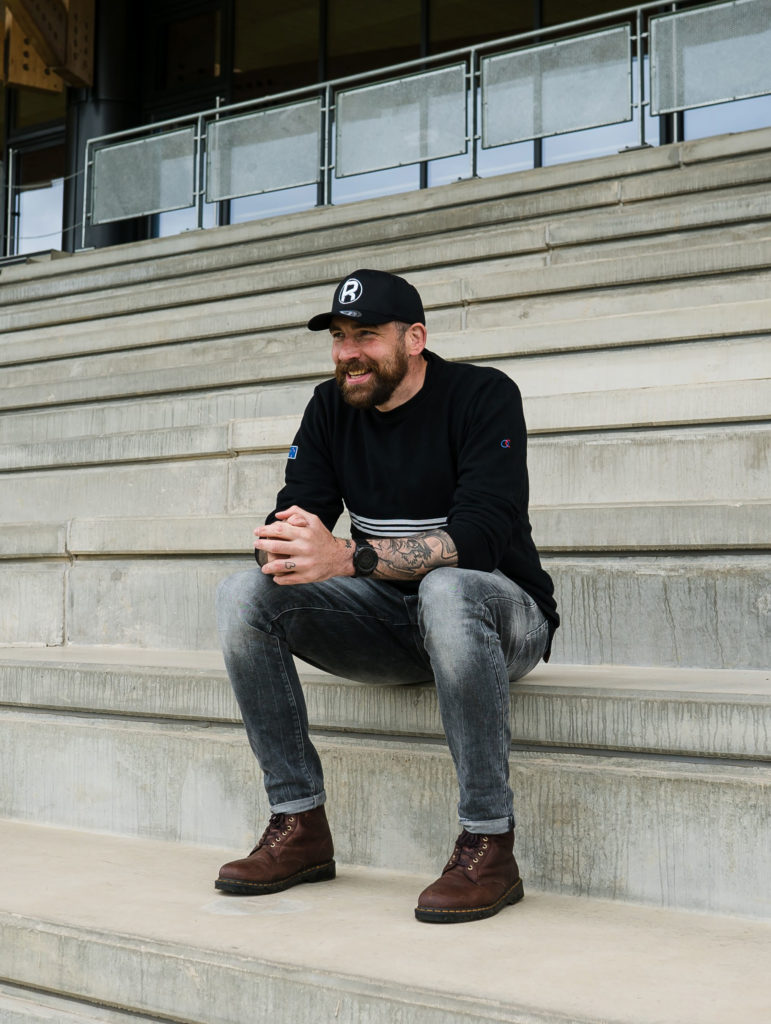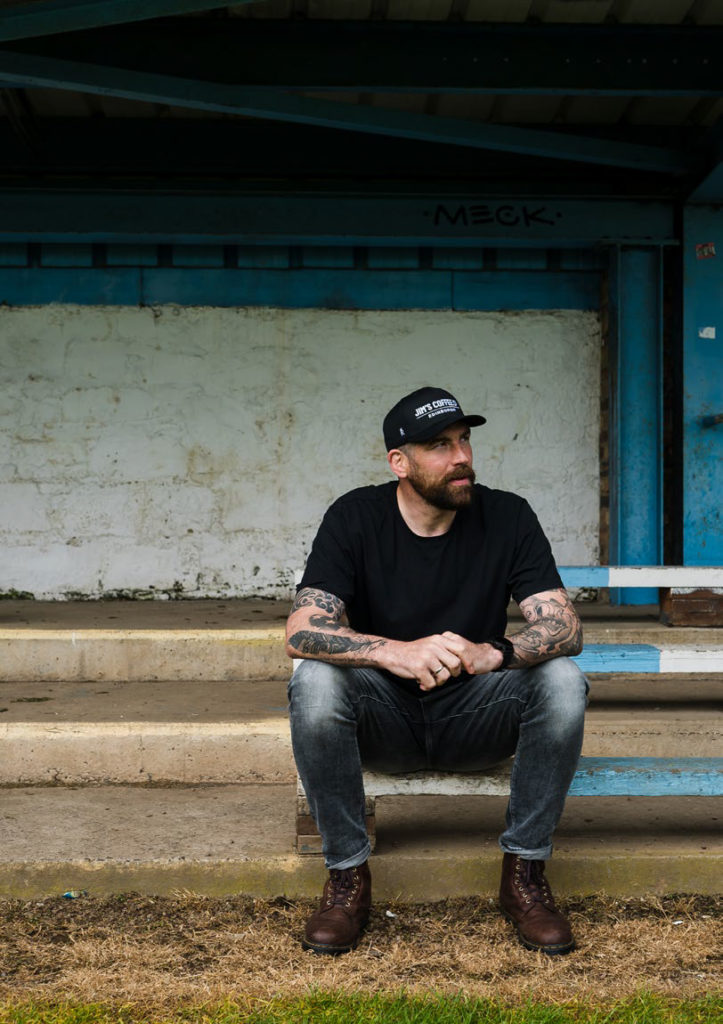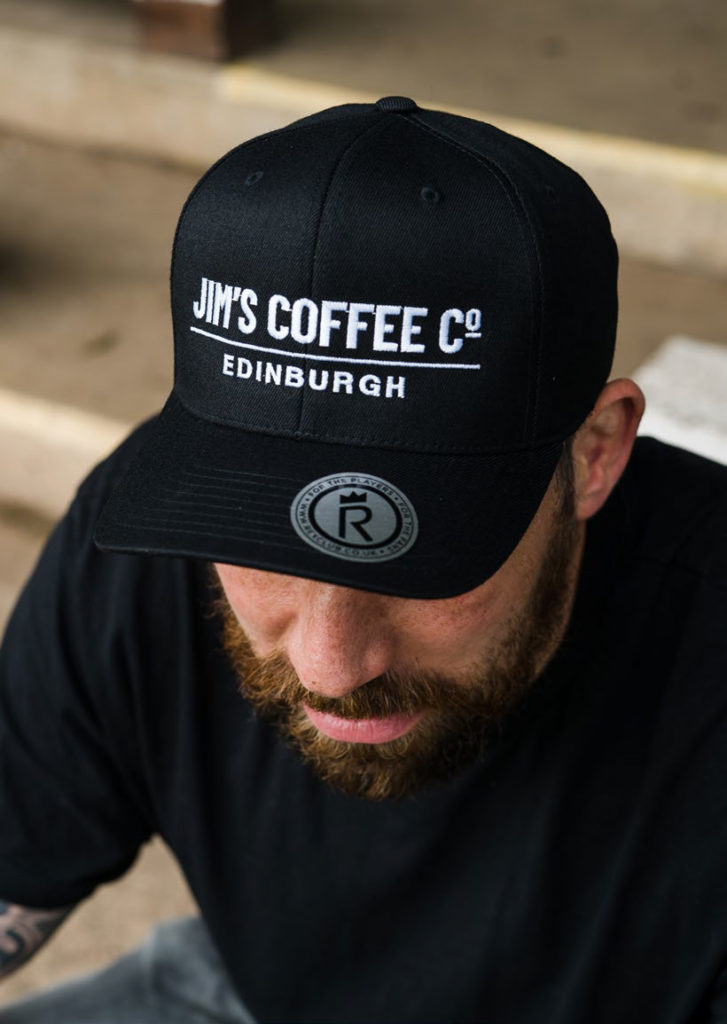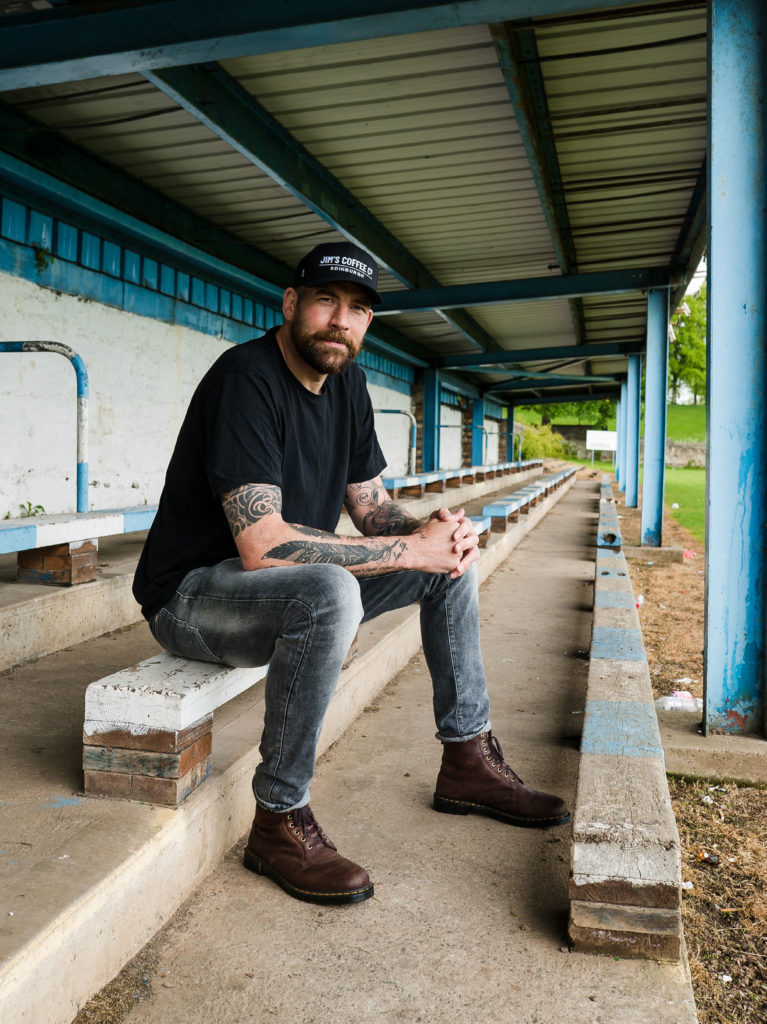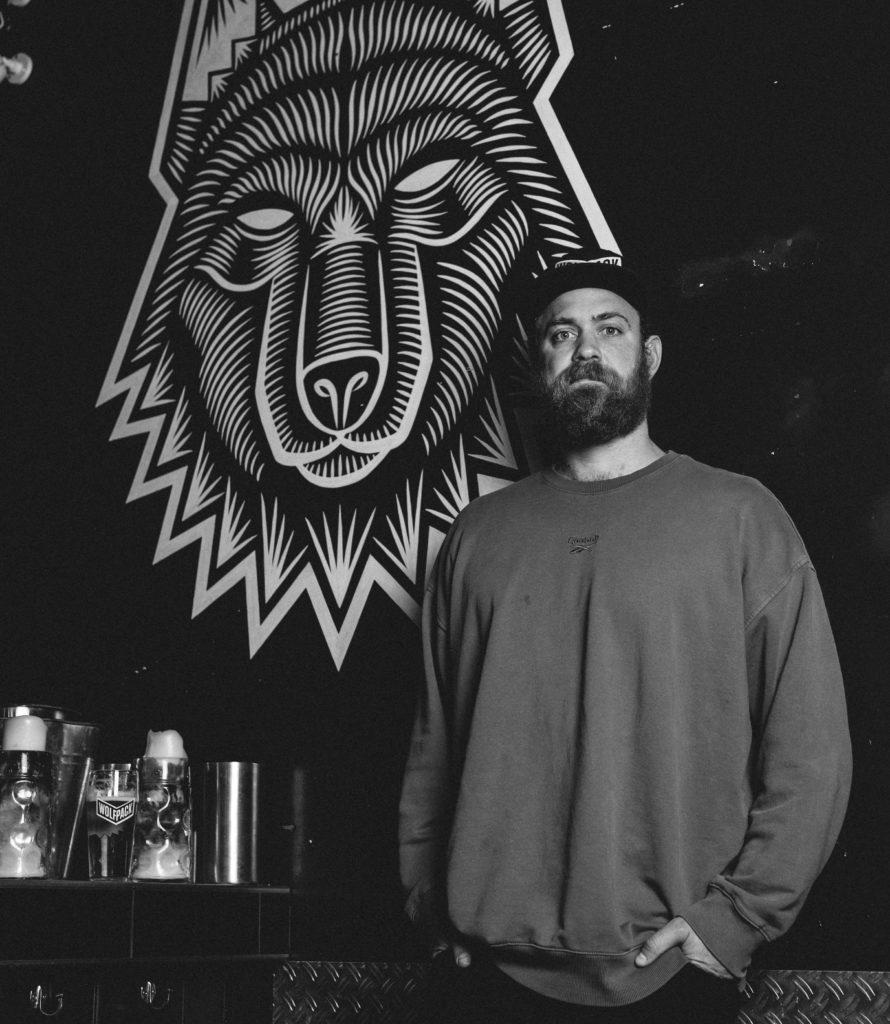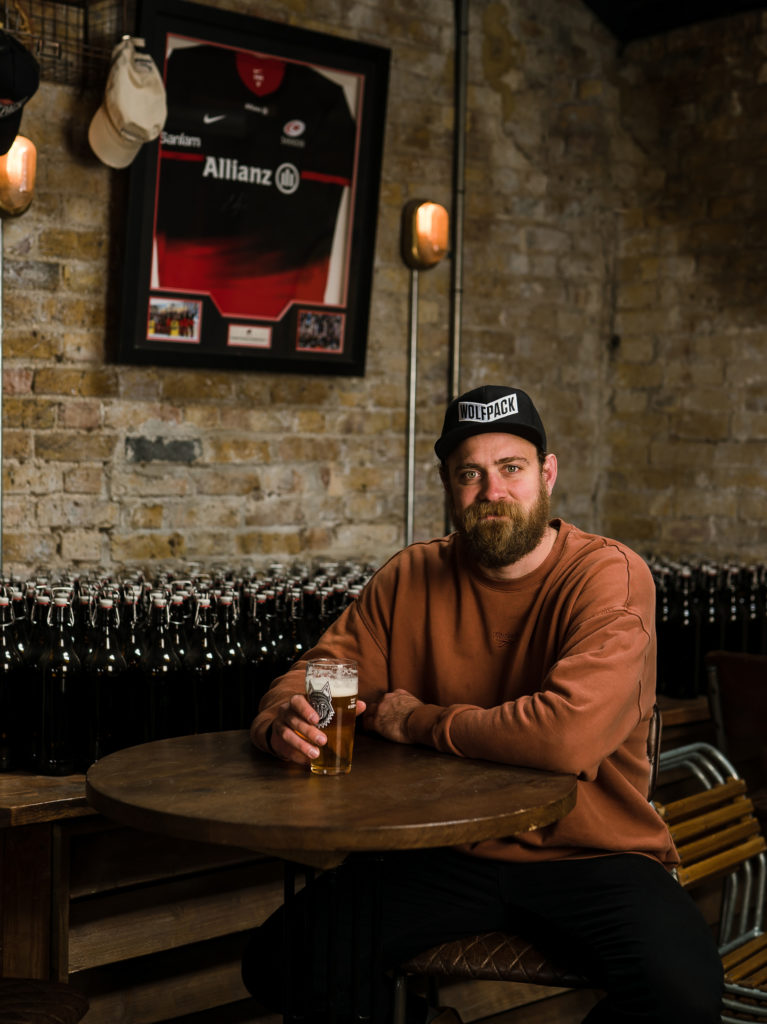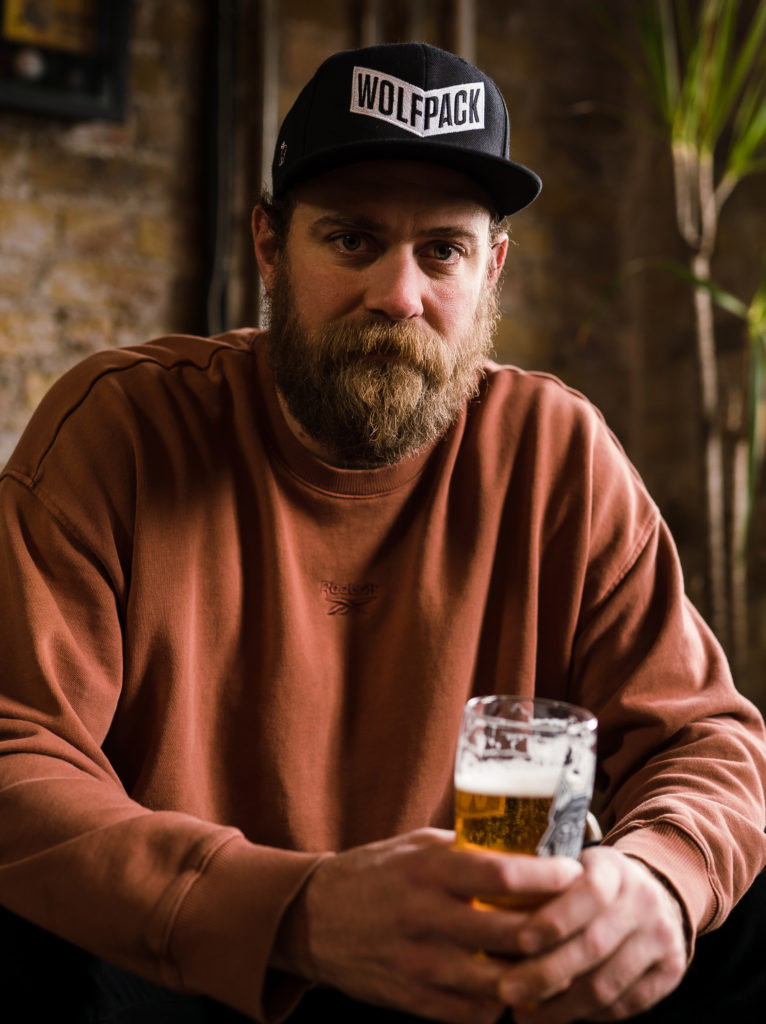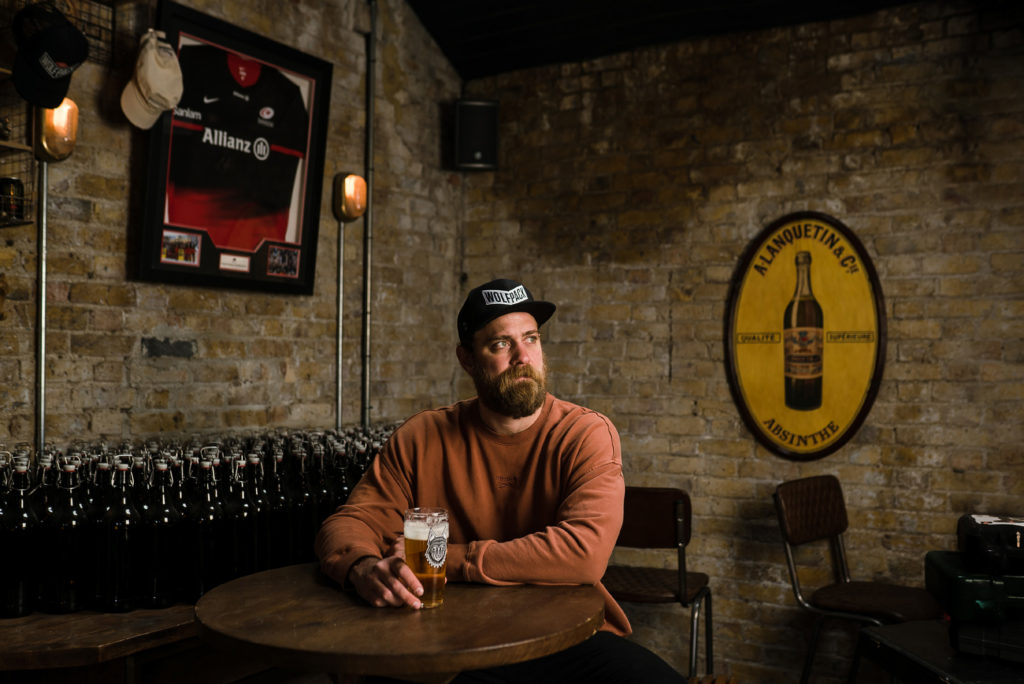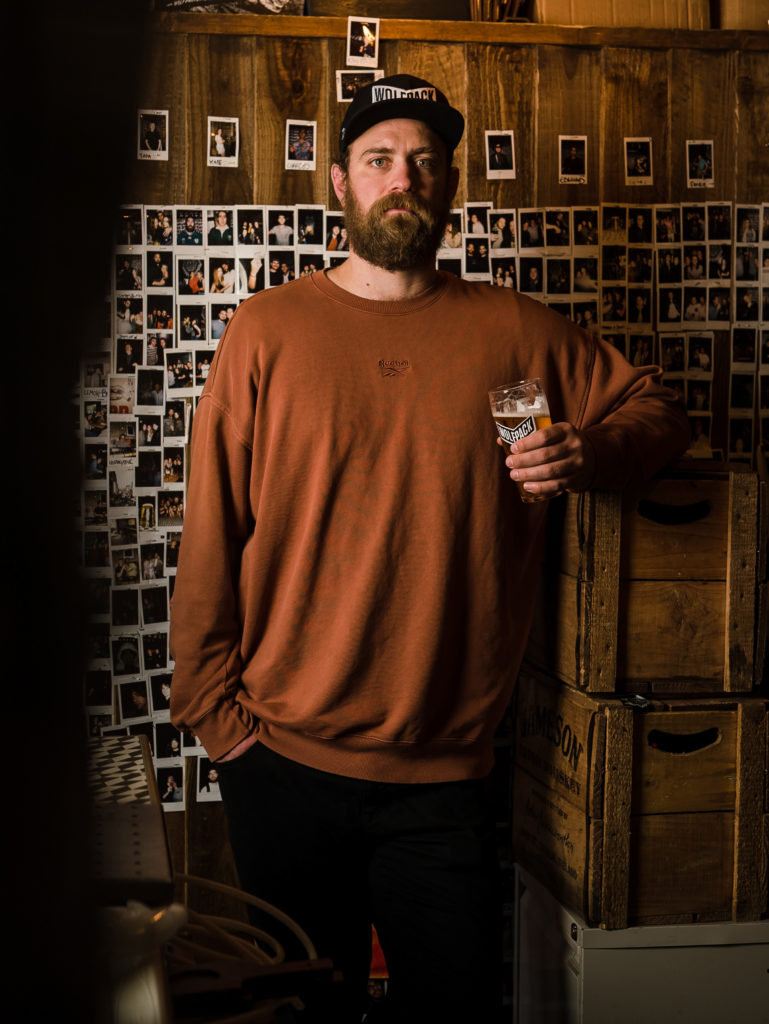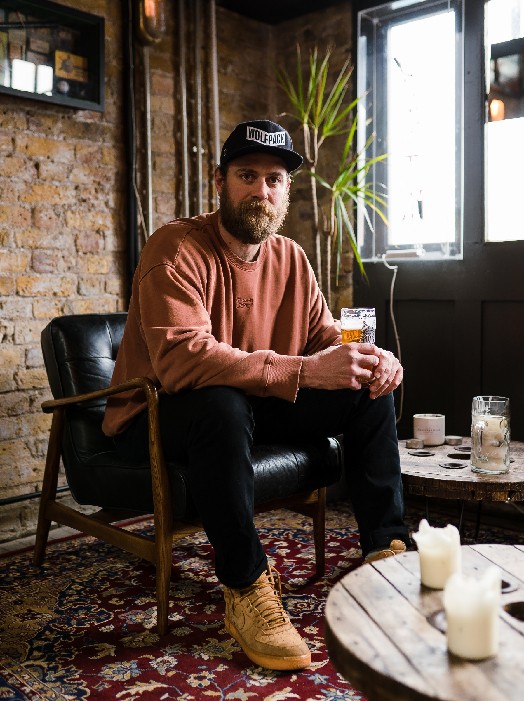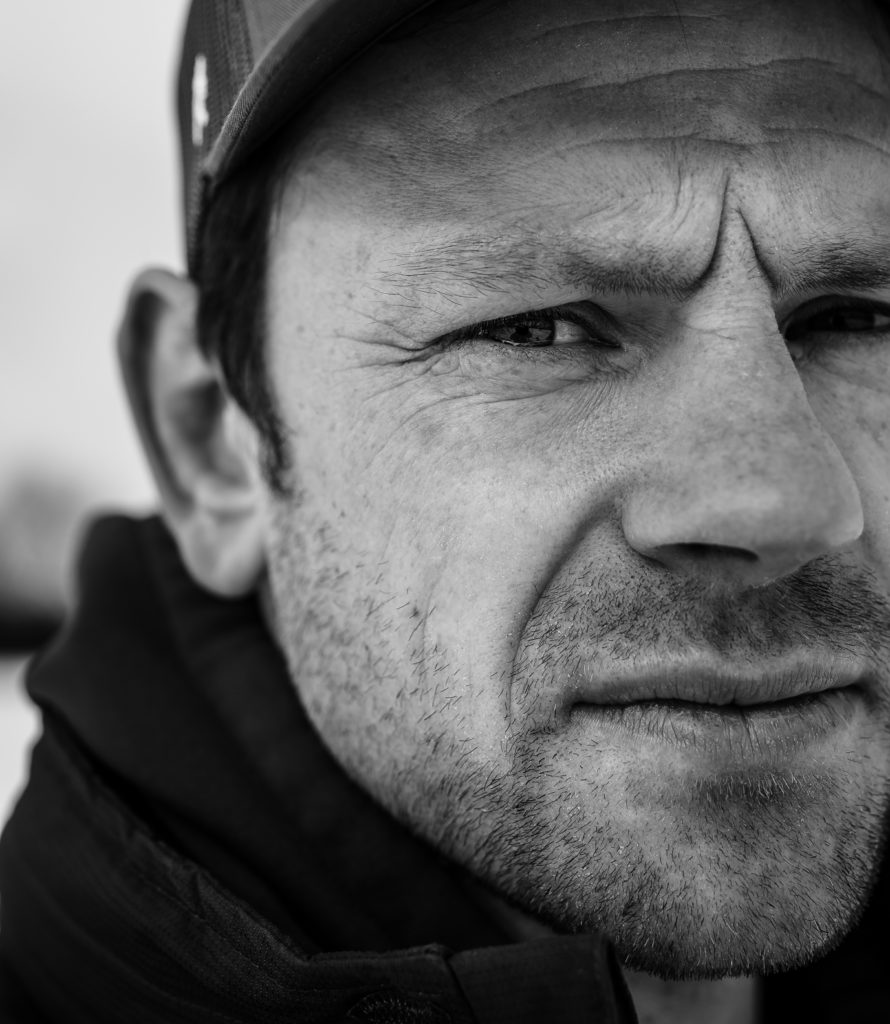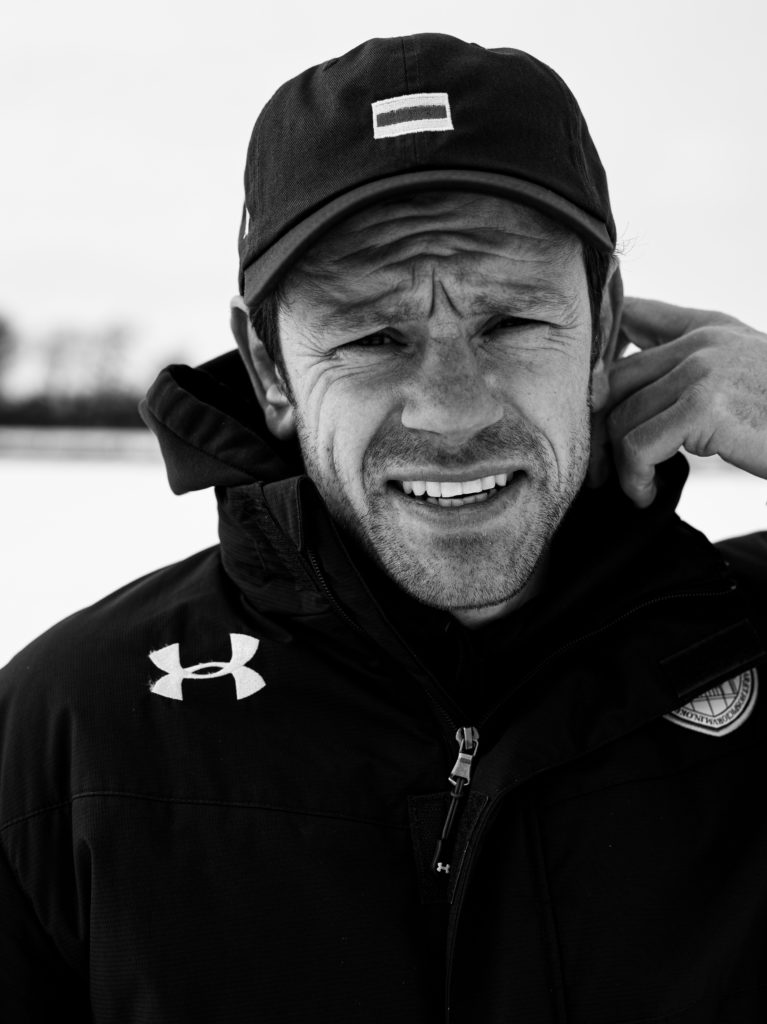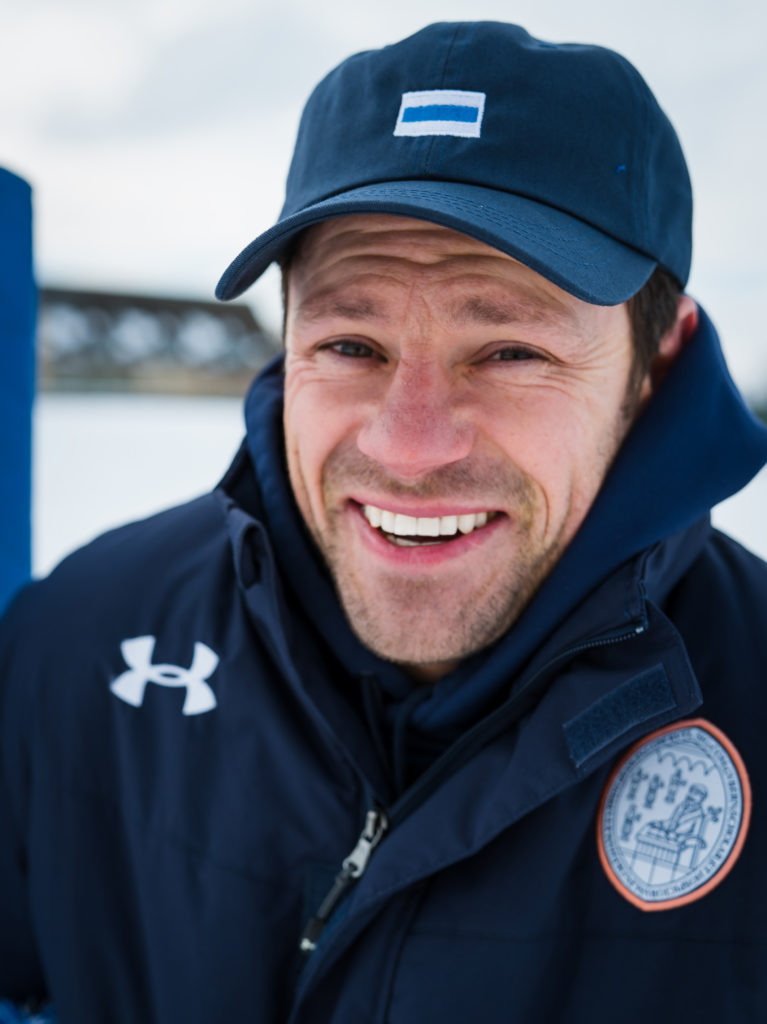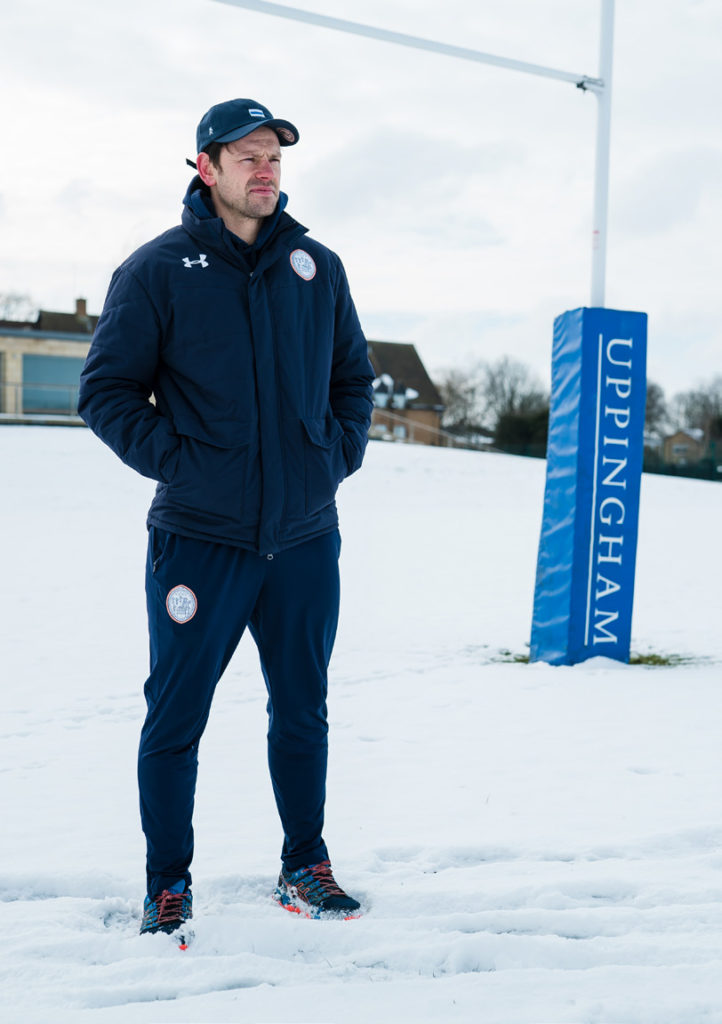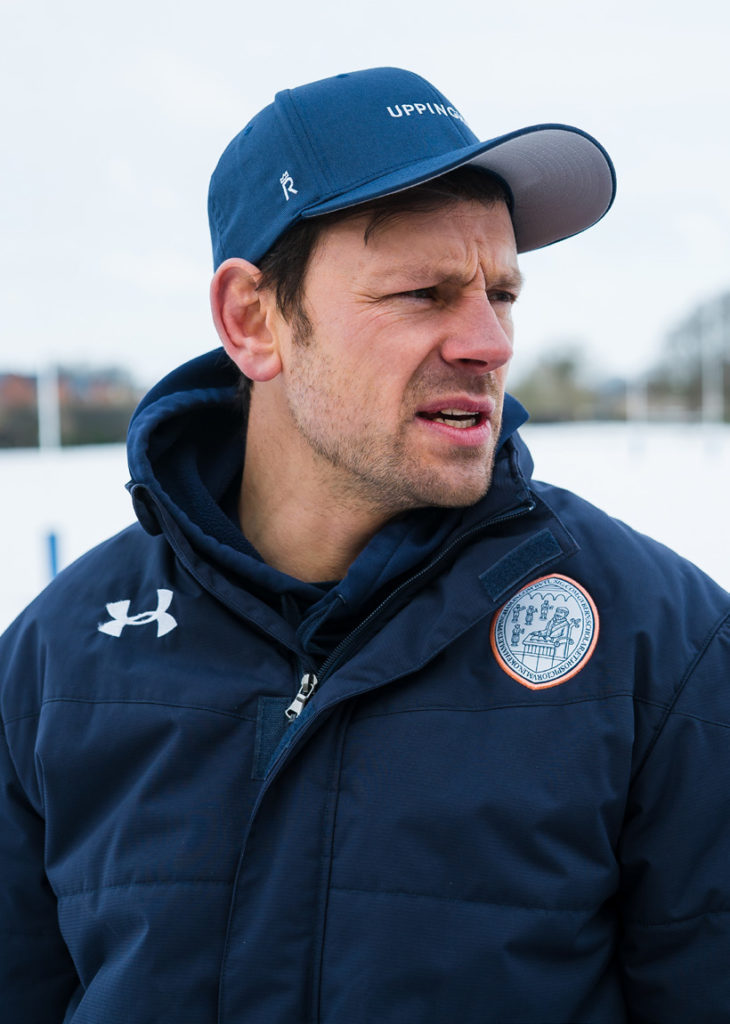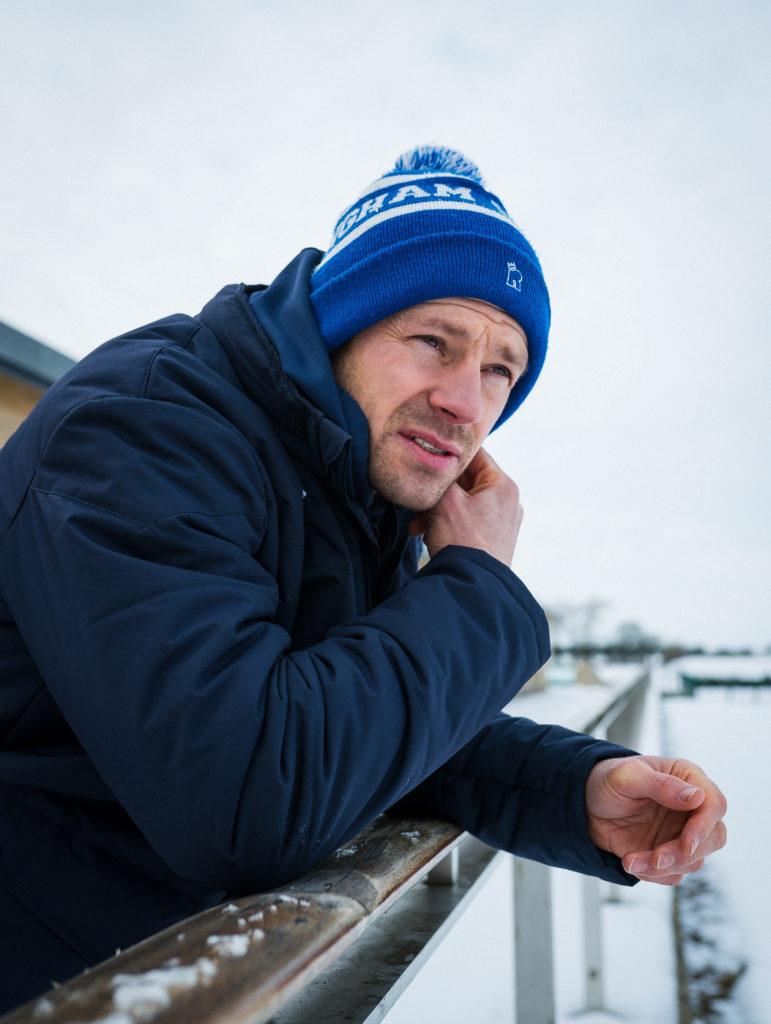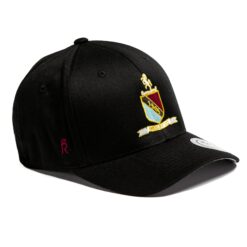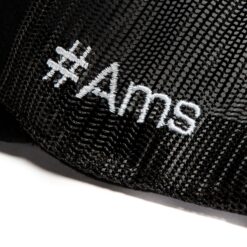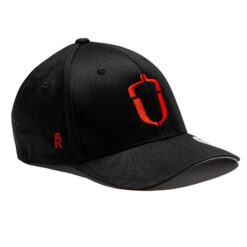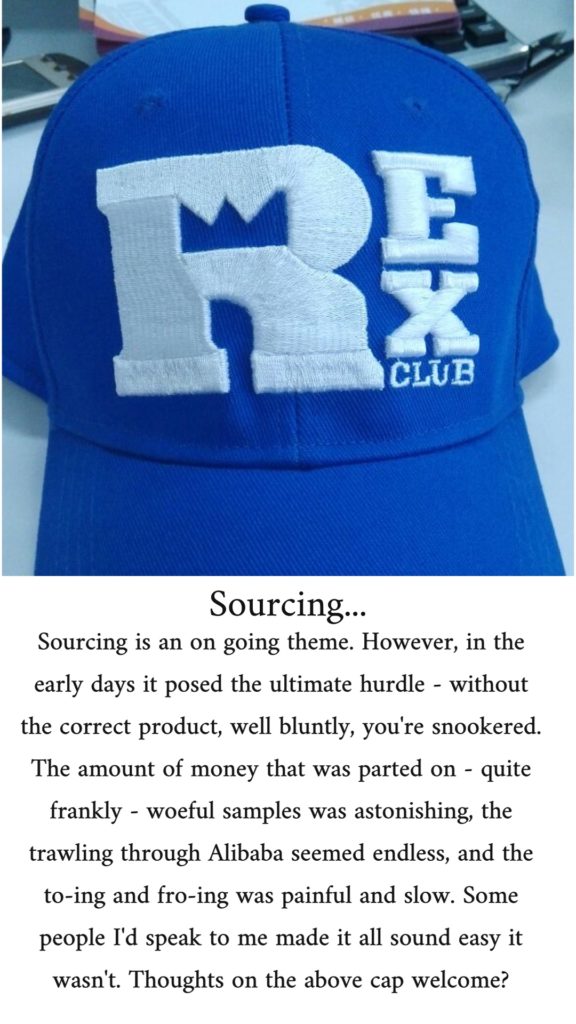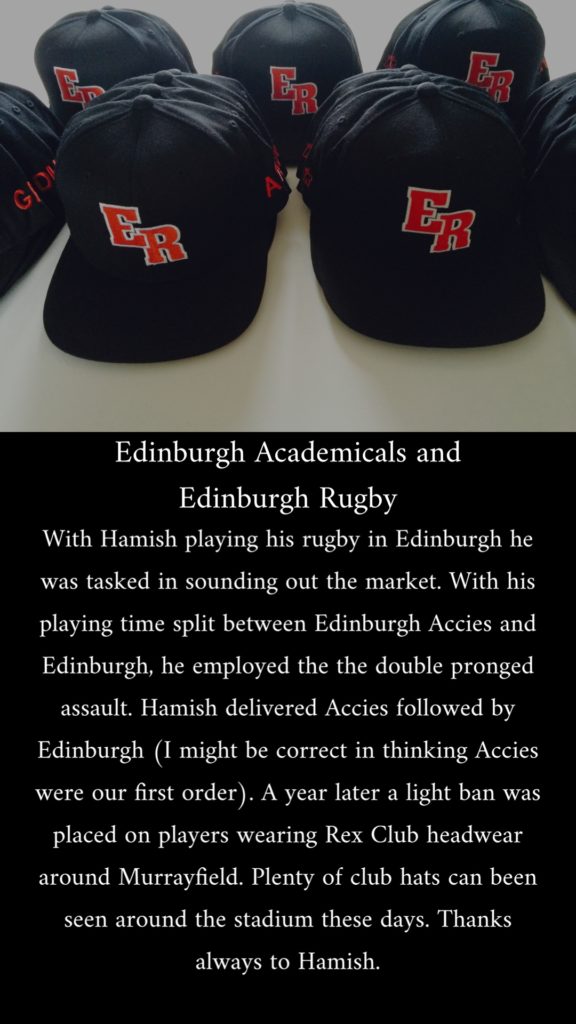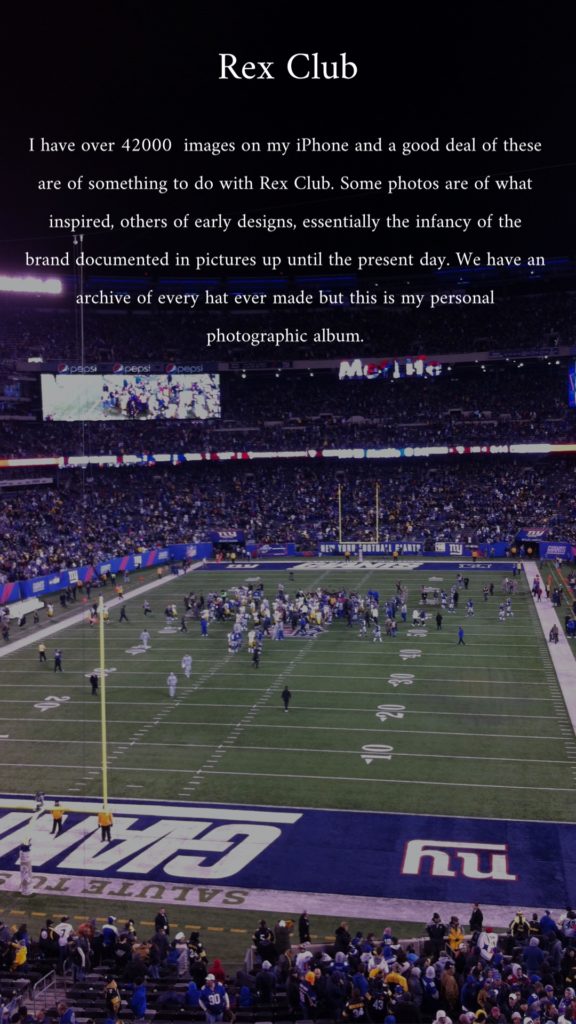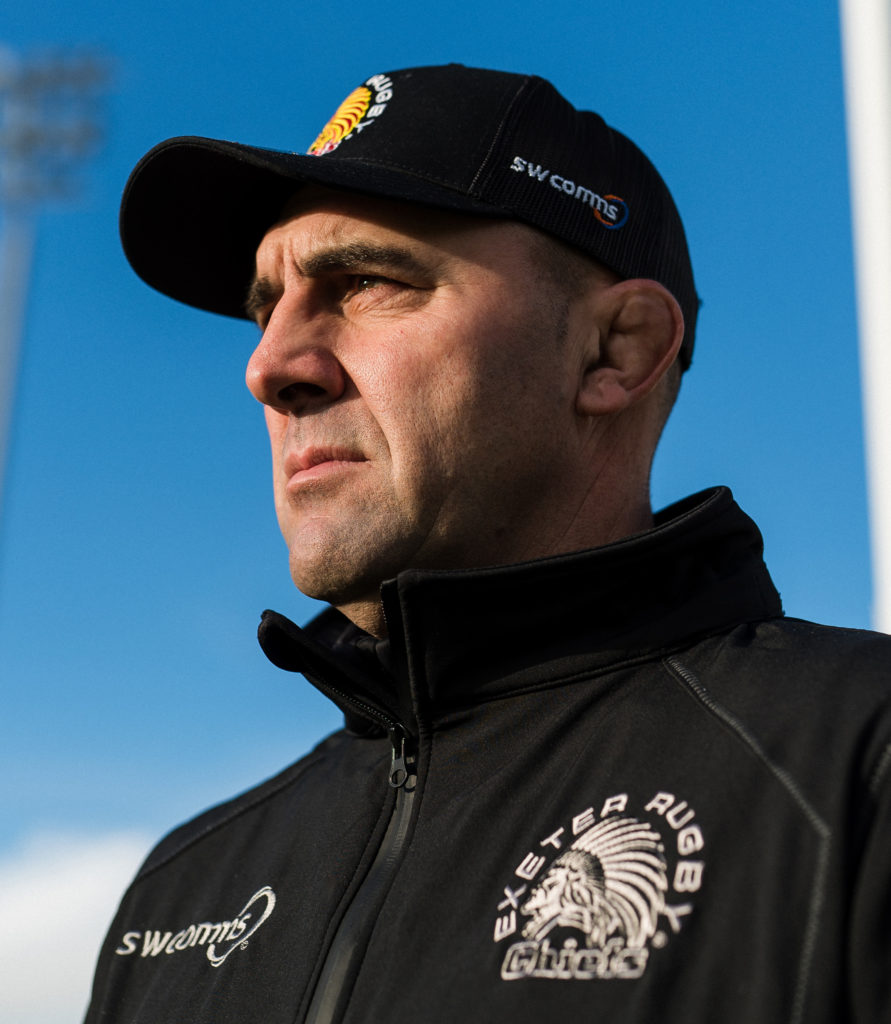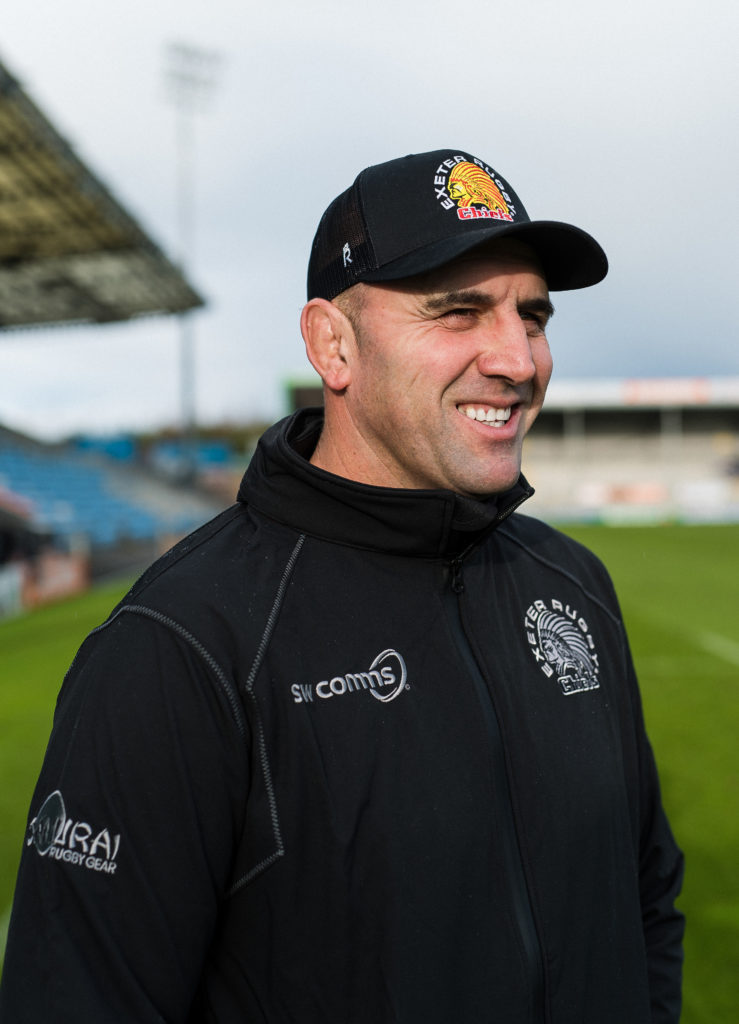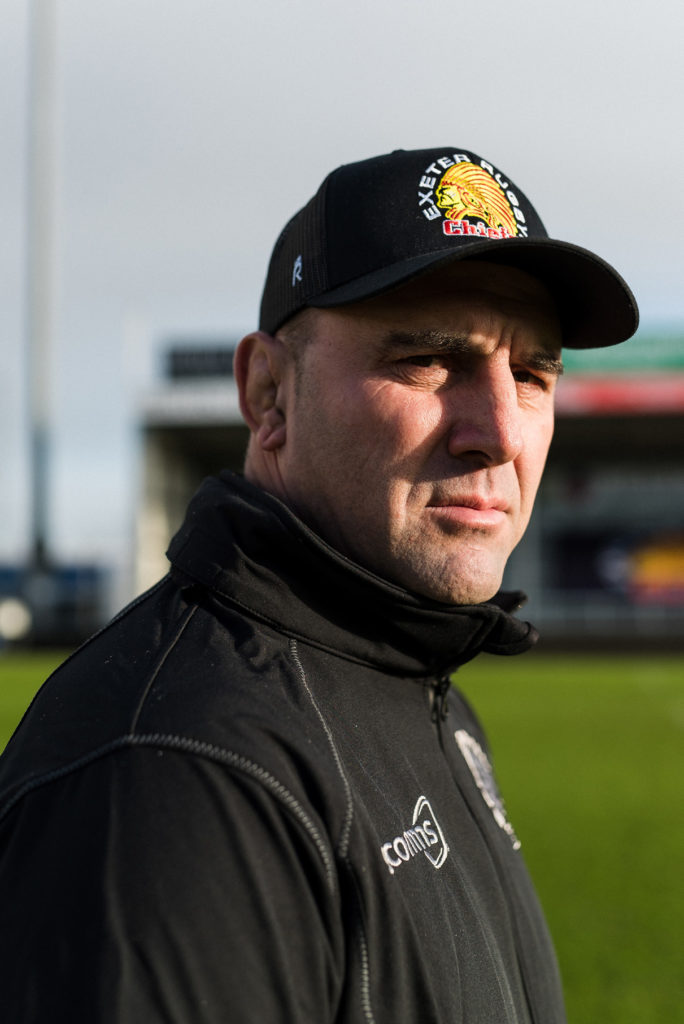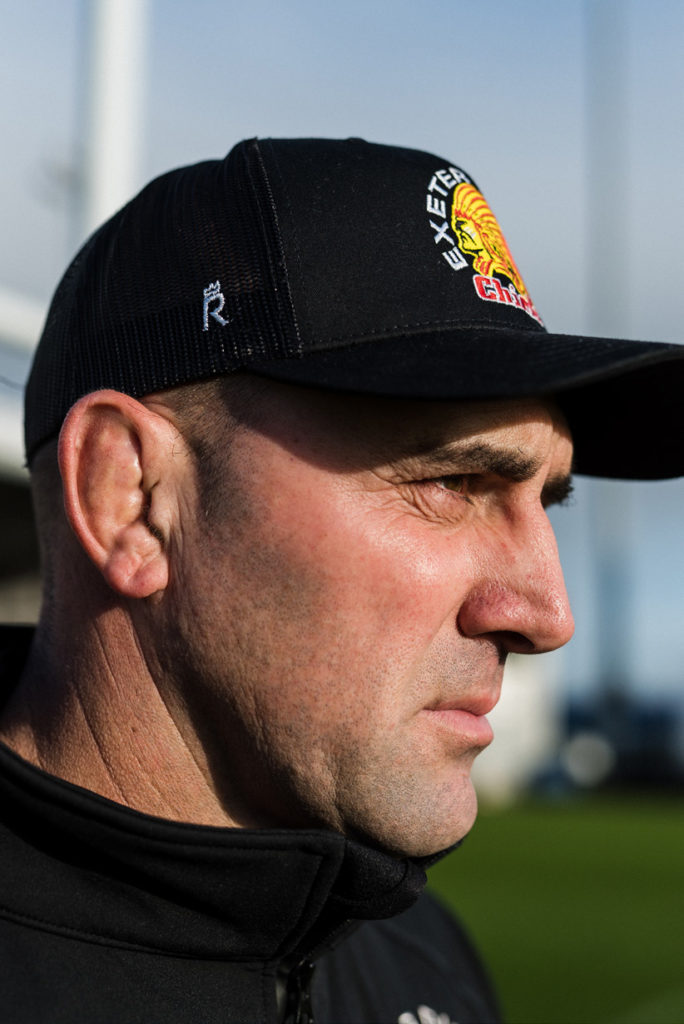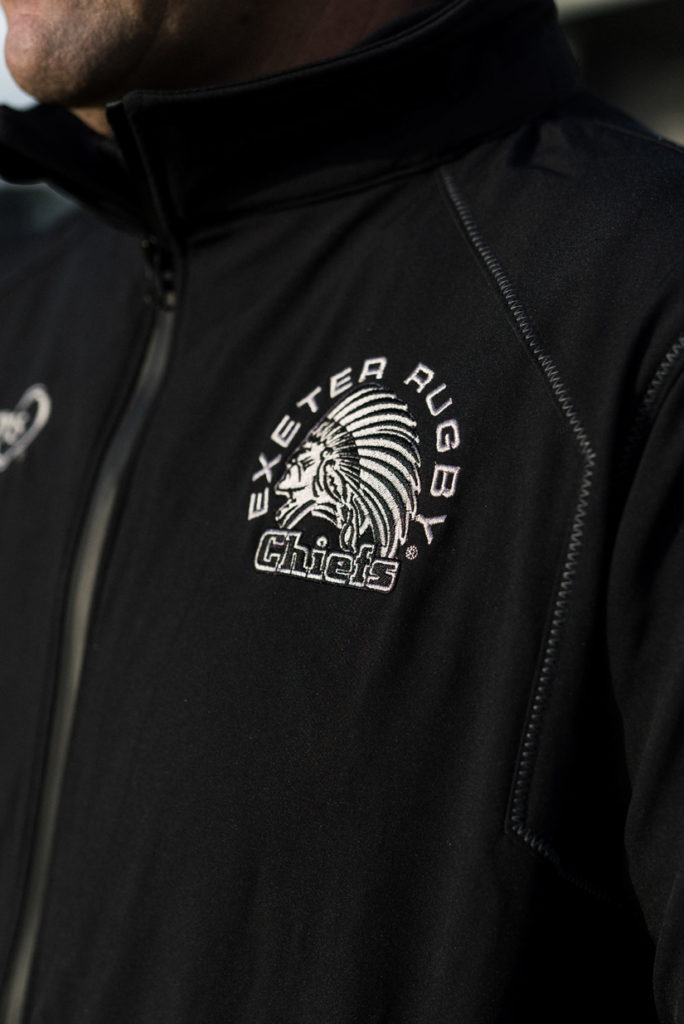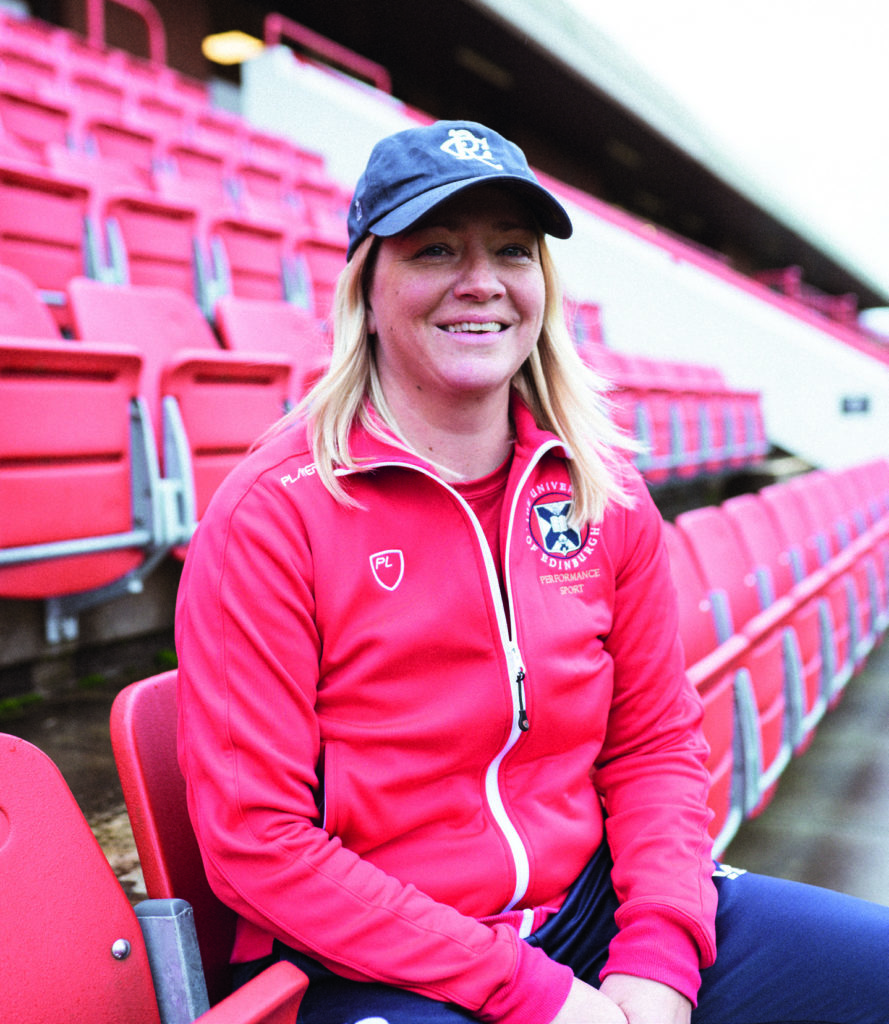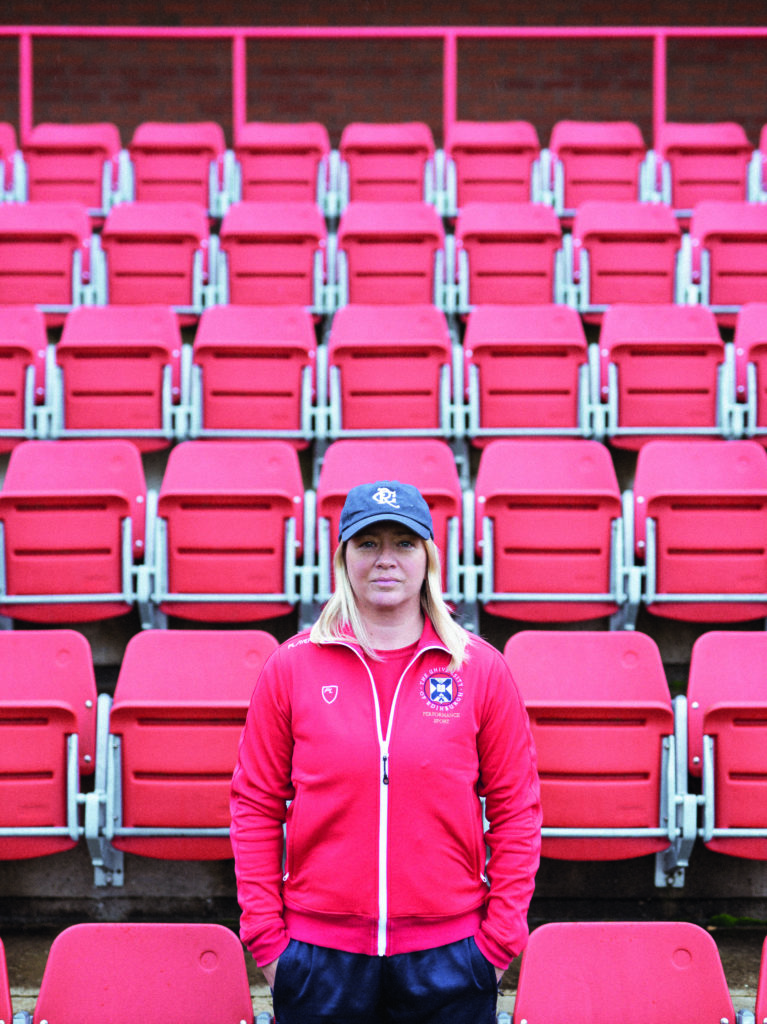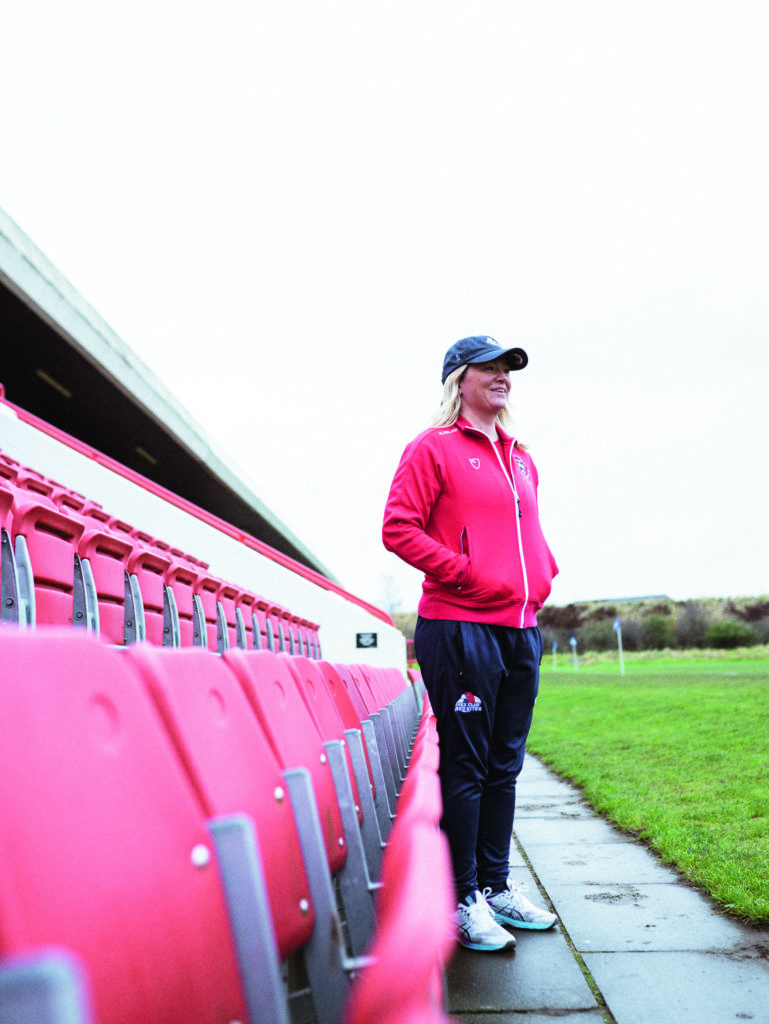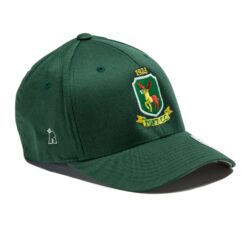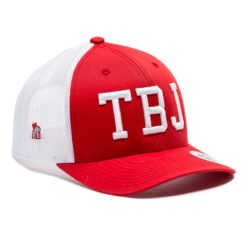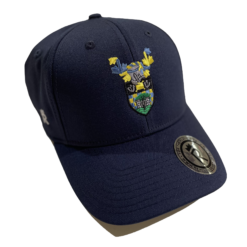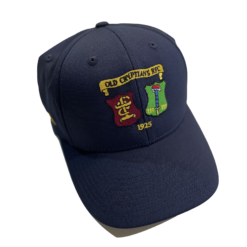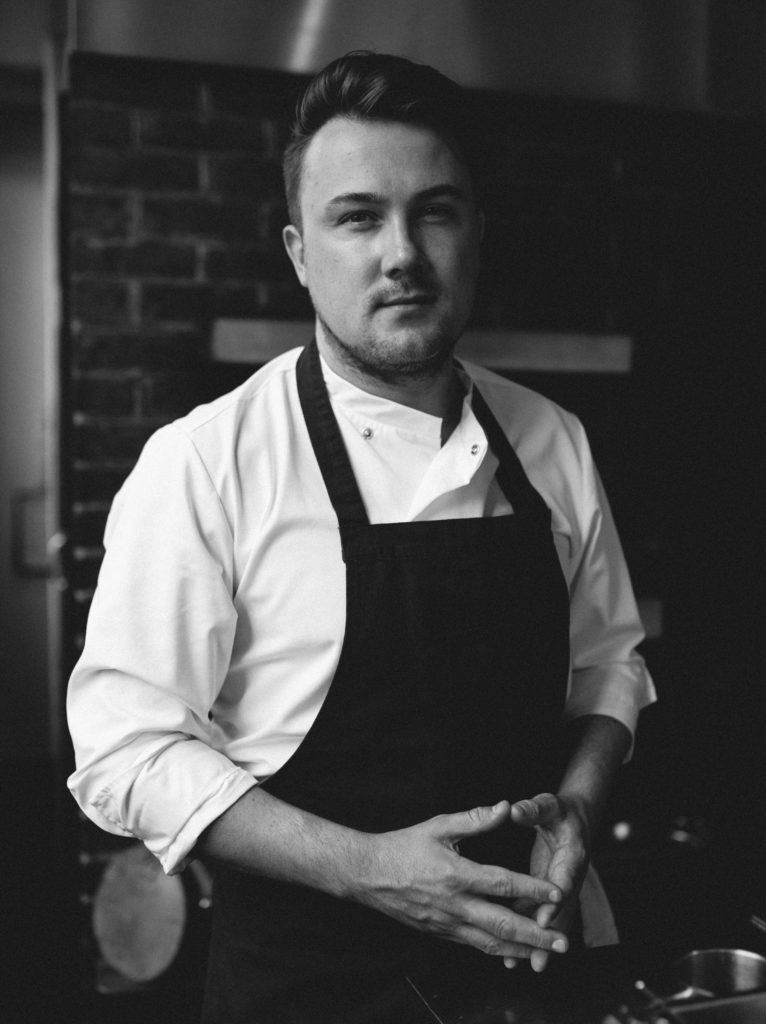
Tomos Parry emerged from Angelsey, Wales, and quickly took the culinary scene by storm.
He opened his first solo restaurant, Brat, in 2018 and won a Michelin star within its first year.
Tomos
Parry
interview by Naomi Prakash
photography by Oscar J Ryan
Following a career working in some of the most beloved restaurants in the country including River Cafe, Kitty Fisher’s and The Ledbury, he is now known for cooking over roaring open fires and prioritising great fresh produce.
We met up with Tomos to discuss his cooking journey and how he finds space for sport in the kitchen.
“About ten years ago I opened my own pop-up in Climpson’s Arch in Hackney. It was based around cooking over an open fire, which is a natural part of the country lifestyle in Wales.
I realised then how much I loved that way of cooking.”
Tell us a bit about your background and how you first developed a love for food.
I grew up in Angelsey, North Wales, right on the sea. Growing up there, you’re surrounded by cafes cooking shellfish and fresh fish. As a kid, your summer jobs are always in a cafe like that, so you start prepping mussels at a young age! I started to actually love cooking a lot when I was young, but then I decided to go to university in Cardiff to study History & Politics. It was pretty awesome coming from a small town then moving to a buzzing city like Cardiff, there’s so much happening all the time. That’s when I actually started seriously thinking about food, I stopped going to lectures and spent my time cooking instead. I got my degree though, but I immediately went into restaurants and started training to be a chef afterwards. I thought about Investigative Journalism, but really I was just confused. I thought I should follow the more traditional route that everyone else was doing. But I didn’t end up accepting my offer for the Journalism Master’s, and followed my growing passion for food instead.
When did you first realise that you could make a living from cooking?
It depends on what you mean by ‘a living’! I’ve lived through a lot of change in the hospitality industry – when I started the pay was low and hours were long, but now it’s very different. You can make a really good living out of it. Before, you really had to commit yourself to working every day and making no money, but now the industry has changed and there’s more of an appreciation for a work-life balance.
Where did you find inspiration during your early years in professional kitchens?
Definitely at River Cafe. Not even just food-wise, but culture-wise. Ruth Rogers was and still is a master of kitchen culture, and she can inspire a team like no one else. It’s the little things she does: the first week I was there, I was on the dessert section and had no idea what I was doing. Oprah Winfrey came in, and Ruth brought me over to her table to present the desserts. I wasn’t confident at all, but I thought it was amazing that she had so much faith in a new person. In most kitchens, there’s a really established hierarchy, but she’s breaking that mould. Plus, cooking-wise, I take a lot of inspiration from Francis Mallmann of South America. His Chef’s Table episode is amazing, it’s beautifully shot and actually reminds me of Wales. He uses open fires too!
How did you gather the momentum to open your own restaurant?
About ten years ago I opened my own pop-up in Climpson’s Arch in Hackney. It was based around cooking over an open fire, which is a natural part of the country lifestyle in Wales. I realised then how much I loved that way of cooking. From then on, I decided to focus on woodfire cooking only, which at the time was unheard of in London or any major city like New York. I’d never done anything like that pop-up before so it was quite risky really. I was trying new things like grilling peas on a fire and trying things out on my own terms. That pop-up became really popular, and one day some guys from a restaurant in Mayfair came round and tried my grilled grouse dish. They asked if I wanted to join a restaurant which was called Kitty Fisher’s. I joined them, and once we opened it became an overnight success to a ridiculous extent. It was a perfect storm – the timing worked, they had connections, and it just grew quickly. That’s where I got to hone my cooking style further. Later on, my business partner Ben (who had been my best friend for about ten years) opened a restaurant called the Smoking Goat. He gave me the opportunity to open my own place upstairs, and that became Brat.
What does ‘Brat’ mean?
Brat is an old word for turbot – our signature is a whole turbot cooked over flame, which is a recipe from the Basque country. It also means ‘apron’ in Welsh, so everyone who’s Welsh and comes to the restaurant thinks I’ve named it after an apron!
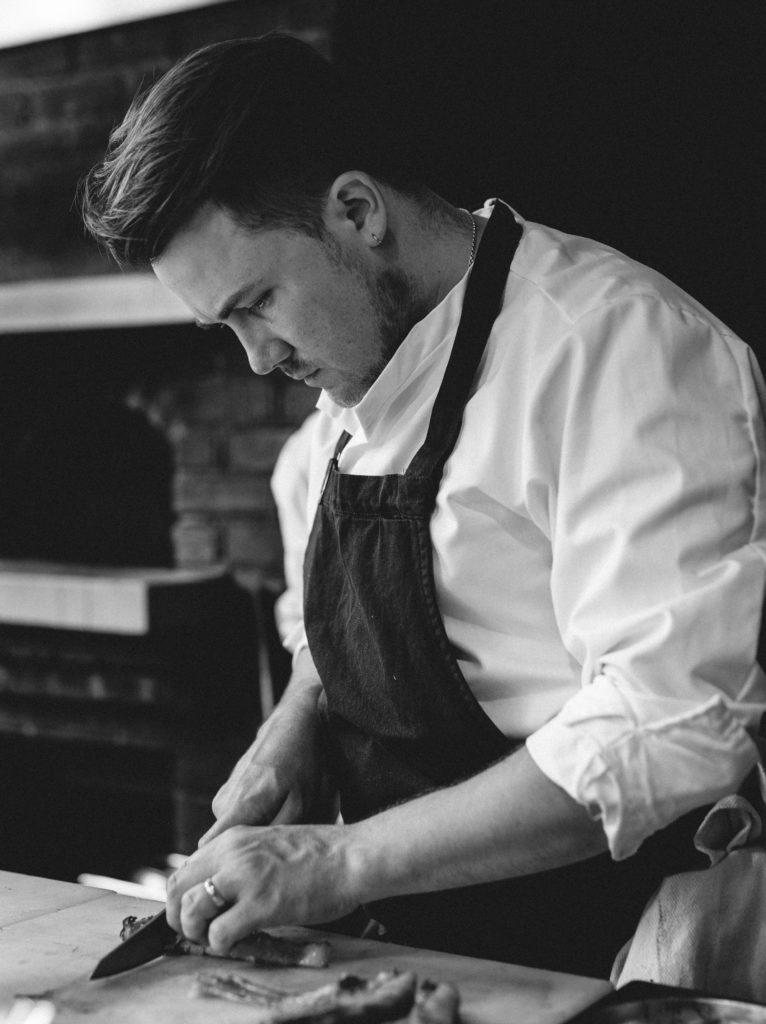
What have you learned while finding your focus in the culinary world?
When I was growing up, I thought everyone was an expert on everything. So if you were a chef, you could cook every type of cuisine. If you’re a filmmaker, you could work on all genres of film. But actually, the more focus you have, the better. Giving yourself absolute boundaries is important for finding your expertise, and it doesn’t even have to necessarily be what you like most.
What advice would you give to young chefs?
Have perspective and see perfection in imperfection. That’s a big deal in my restaurant and within teams in general. For example, you can’t always hire the perfect team, but you have to maximise certain qualities from different people to make it work. It applies to things like plating up, too. People can get too focused on detail, rather than just ensuring the food is great. There’s a lot of pressure on young chefs at the moment: they’re in the kitchen all hours and then they look on Instagram and their mates around the world are doing cool things in the culinary world. The constant comparison is so hard, and you’re never really happy with your own work. So, keeping the sense of perspective there is really important.
We know you have a love of sports. Did you develop that passion at a young age?
Absolutely. I started playing rugby and football in school – you can’t really avoid it in Wales even if you wanted to! Football is my first love because I’m from North Wales, and a lot of my family work in football. I used to play at a better level than I did for rugby, I went to the trials for Everton and things like that. I wasn’t that good – I was mainly just really enthusiastic. Actually, it turns out I was at a trial camp with Wayne Rooney when I was younger. The trials must have gone better for him than they did for me!
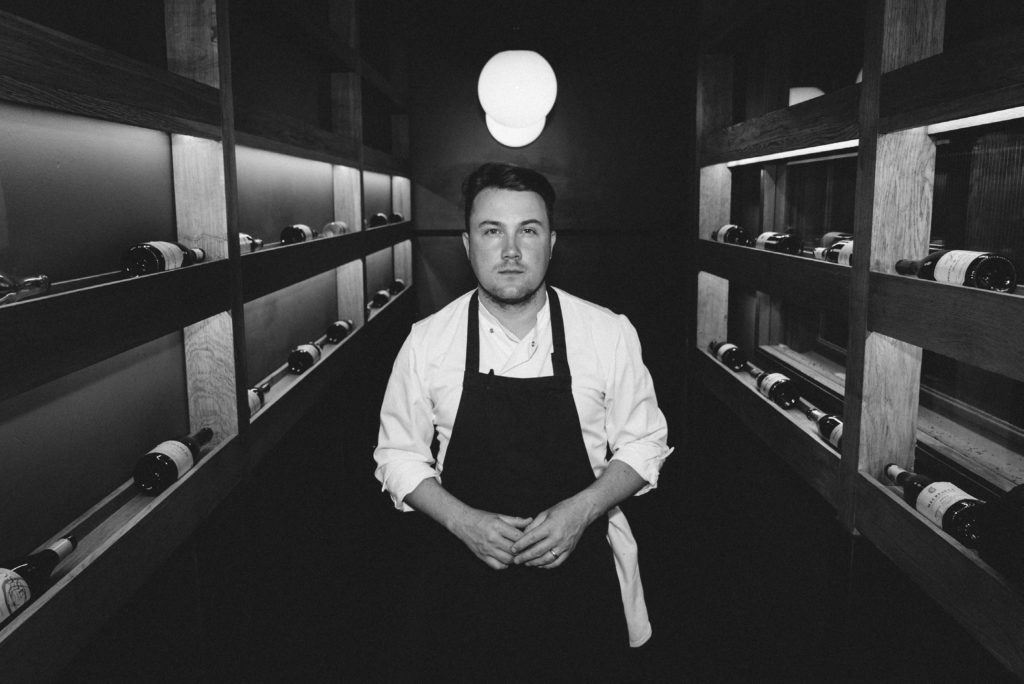
Do you have any stand-out sports memories?
I was in Japan for the Rugby World Cup, cooking with WagyuMafia. I got to watch a few games and some training sessions, and lots of the players came into the restaurant. It was an amazing experience to get to know some amazing players and cook great food at the same time.
Do you find any commonalities between cooking and sport?
I draw lots of inspiration from the Basque Country, and it’s interesting because sports and food are so interlinked there. There are tonnes of similarities between sports and cooking. Setbacks, for example. Both in sport and in kitchens, you can have some really tough setbacks or work with some difficult people and you have to pull yourself through. Equally with teamwork, you have to rely on each other so much both in cooking and sport. The kitchen is one of the most democratic workspaces: you can be from any walk of life and become a chef with the same chances as anyone else. You can start as an unqualified kitchen porter and make it to the top, which is rare. In other industries, there are high barriers to stop you from entering, or you need to know the right people. So you get a huge mix of people in each team, which means you need to understand how to blend a team of different personalities well.
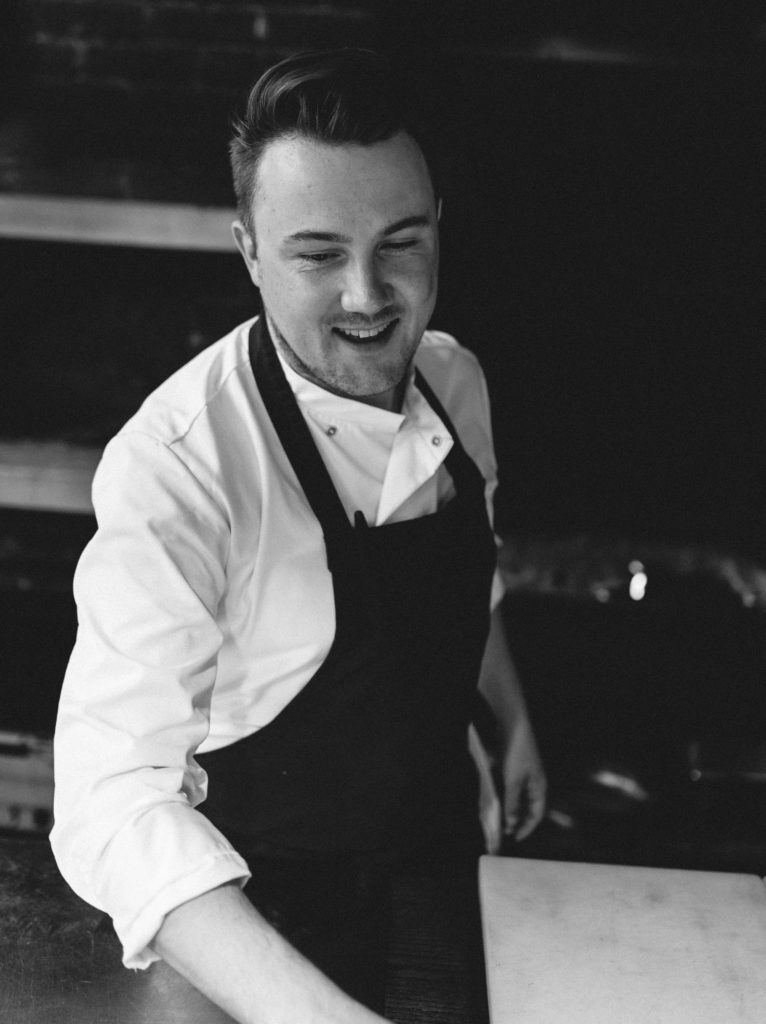
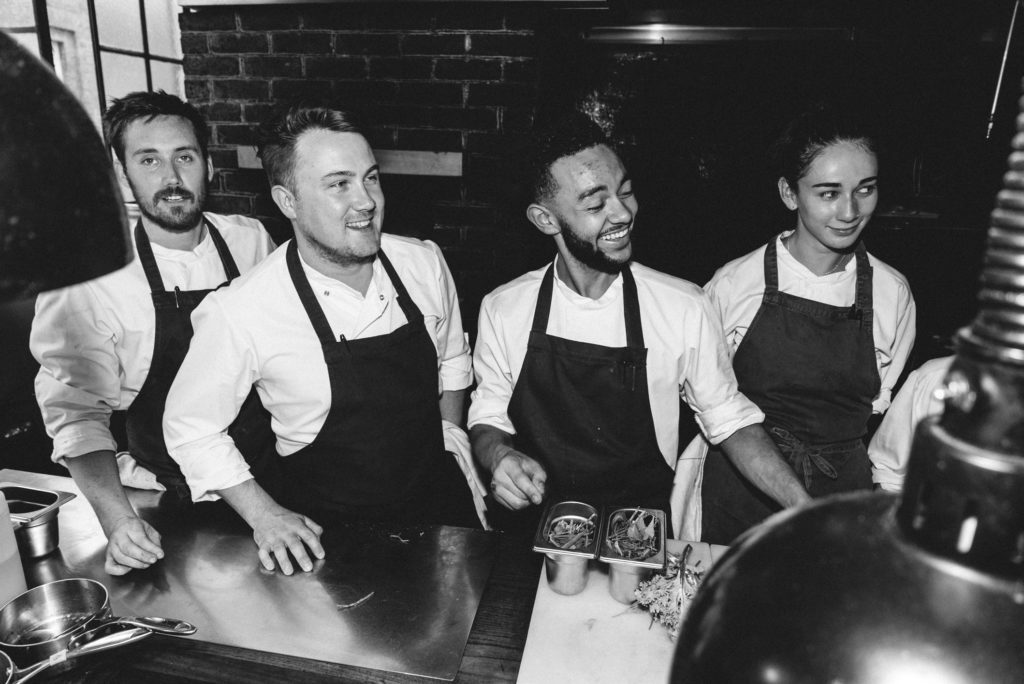
Does sport have a place in the kitchen at all?
I use football analogies in the kitchen a lot. Especially when it comes to talking about management, there’s a lot of parallels on the field and the kitchen. The best managers aren’t always the best players, so I always tell chefs that you don’t need to be the best at everything to make it to the top. Chefs can get dishearted when they realise that they’re not as quick as the person next to them, but they don’t need to be. Some people are just leaders more than they’re players.
Do you manage to find time to indulge your love of sports outside of work?
Of course! I have my two kids and my career, and then the rest of my diary is just sports. It’s also great bonding for a team. We employ about thirty different nationalities and that was great during the Euros: everyone got involved and always had something to say.
“The kitchen is one of the most democratic workspaces: you can be from any walk of life and become a chef with the same chances as anyone else.”

